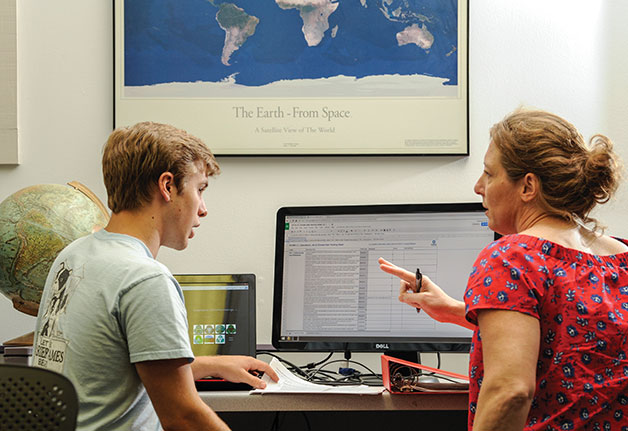How much energy does Wofford College use? What’s the water consumption? What about management of buildings, transportation and waste? By the end of the summer, a Wofford student and professor had a pretty good idea.
Dr. Amy Telligman, assistant professor of environmental studies, and J.J. Smith ’20, an environmental studies major from Spartanburg, were awarded a Summer Collaborative Research Grant from the college to assess the sustainability of Wofford’s campus systems and culture of sustainability. They spent the summer collecting data to get a baseline that the college can use to evaluate future improvements.
“J.J. was in my class in the spring, and we talked about the campus as a living lab that we can use to learn and also to improve the overall sustainability of the campus,” says Telligman. “Now he has paired that classroom knowledge with real experience in collecting data. What he’s done this summer will be applicable to work in lots of fields.”
Smith worked with the college’s new energy manager, Rob Richards, and others on campus to gather the data that will eventually be sent to the Association for Advancement of Sustainability in Higher Education (AASHE), a national organization that collects and reports compounded data from across the country. Smith also learned how to develop professional relationships, communicate effectively, be persistent and apply the research methods that until now have been purely theoretical.
“I’m interested in a future career in the field of sustainability,” says Smith, who has learned that the work is not glamorous and can be tedious.
According to Telligman, that’s just part of the experience. “Research is a messy process. It’s slow going, especially at first, and there are lots of ups and downs,” she says. “It’s important for our students to understand that, and these summer undergraduate research experiences are ideal for that type of learning.”
The assessment that Telligman and Smith have been working on was motivated by the Milliken Sustainability Initiative at Wofford College, a $4.25 million multifaceted sustainability program funded by a grant from the Romill Foundation. The initiative also includes a new residence hall, a living learning community focused on sustainability, partnerships with the Northside and Glendale communities, student entrepreneurial opportunities and new faculty and staff in the field of sustainability.
By Jo Ann Mitchell Brasington ’89
